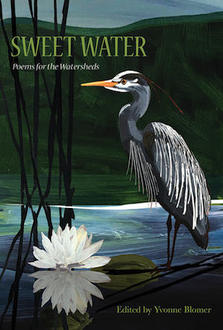
A watershed is actually an area of land—all the land containing rivers, lakes, and streams that drain into a larger body of water, such as the ocean. The Mississippi watershed covers forty percent of continental United States. In Canada, thirty percent of freshwater drains into the Hudson Bay watershed, which spans five provinces. So watersheds are everything, really. Everything we and all other living beings depend on.
Despite this dependence, we don’t often speak of watersheds. Unless you’re a scientist, these days you’re more likely to hear the phrase watershed moment, which derives from the British definition of a watershed: the crest of a ridge dividing two drainage areas. A watershed moment also divides, not land but time. It describes a pivotal moment after which things will never be the same, from which there is no return.
Sweet Water: Poems for the Watersheds (Caitlin Press, 2020) explores both of these complex ideas—the geographic watershed and the urgency of this moment—through the unique concision and grace of poetry.
Sweet Water is edited by Yvonne Blomer, former poet laureate of Victoria, writer, and teacher (and Understory contributor). Yvonne, like Sweet Water’s publisher, is located in British Columbia and many of the hundred-plus poets in this collection are also west-coasters. Otherwise, however, the contributors are diverse and their approaches to the topic expansive.
Several writers remind us that we are water, born out of water, evolved out of water. In “Water to Water,” Kate Braid writes:
Under the guardian cap of the water’s surface
this swimmer finds another
memory, long-forgotten motion flowing
Though we are of and from water, we often forget. We need to be reminded. In “grandmother river,” Solveig Adair tells of bringing her grandmother to the river’s edge to reconnect with both their own life history and that of our species:
before she died she
knelt in the river and when
I blinked there was no
distinction between her and
the water body
Necessarily, many contributors to Sweet Water lay bare the destruction of our watersheds, thereby linking the geographic and the idiomatic. In “The Last Lake Sturgeon,” Christine Schrum wills readers to face our shortsightedness:
They outlived the dinosaurs
but we’ve brought them to the brink
of extinction. In Lake Superior
the silver bellies of sturgeon swell
with minuscule plastic beads
because we wanted
blackberry sugar body wash
acne exfoliator, 3D white teeth….
There is hope, of course, the possibility that a watershed moment will save our watersheds, because for the many who are shortsighted there are many willing to look and to live by what they see. In “-40°C” Eleonore Schönmaier writes about her father—beautifully, through the point of view of her mother:
She turns up the heat: the house
will be warm for the first
time in fifty year. Father.
Are there not many versions
of warmth and wealth?….
Although many of the poems in Sweet Water are from a settler perspective, Indigenous writers offer essential context and experience. Katherena Vermette’s “Where” encapsulates devastating violence toward land and people as well as the hope to be found both in tradition and in moving forward:
there is still tobacco
and there is still fire
here with the river is where
I will remember
Philip Kevin Paul, a member of the WSÁNEĆ Nation, opens the book with a story about bridging Indigenous Knowledge with “current scientific ‘discovery.’” Written in poetic prose, it’s a fitting opening to a book that bridges many ways of understanding and expressing our connection to watersheds. To this end, the book includes a section of “Notes and Ecologies of Poems,” which provides insight into the personal and ecological significance of poems. Thoughtfully, these notes are placed the end of the book (rather than with each poem) such that the poems may stand alone or be read with additional context.
Sweet Water is a beautiful contribution to a growing body of literature on the ecological crisis, offering not only exquisite observation but deeply felt experience and clear reason for action.

